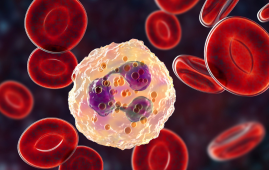

Exploring the Gut-Aging Connection
A recent study published in Aging-US reveals new insights into how the gut microbiome influences the aging process and age-related diseases. Conducted by researchers at the Institute for Genetic and Biomedical Research (IRGB), Italy, the study identified specific gut microbiome and metabolic pathways that may impact inflammation, cardiovascular health, and macular degeneration. These findings may pave the way for microbiome-based interventions to help manage age-related conditions.
Explore All Geriatrics CME/CE Conferences and Online Courses
Key Findings: Gut Microbiome and Disease Risk
The gut microbiome, a diverse community of microorganisms in the digestive tract, plays a central role in immune function and metabolic health. With aging, changes in this ecosystem are often linked to inflammation and the development of chronic illnesses.
Using Mendelian Randomization, the researchers analyzed 55,000 potential causal relationships between gut microbial traits and age-related health markers. The study confirmed 91 significant connections, including:
- Higher levels of specific bacteria linked to age-related macular degeneration (AMD)
- A gut metabolic pathway called purine nucleotides degradation II is associated with lower ApoM levels, a protective protein against heart disease
- Variations in gut bacteria effects based on blood type, especially blood type A, influence proteins tied to cardiovascular risk
These results were validated in independent datasets, providing strong evidence of a direct gut-brain-heart connection.
“Unlike previous studies, we performed replication analyses for the significant results using independent GWAS datasets, a fundamental step that has often been overlooked.”
Implications for Healthcare and Future Therapies
This research suggests that gut microbiota could be targeted to delay or reduce age-related inflammation and disease progression. By understanding how gut bacteria interact with genetics, clinicians may develop personalized treatment strategies that incorporate:
- Dietary interventions
- Probiotics or prebiotics
- Microbiome-focused therapeutics
While further studies are needed to fully clarify the biological mechanisms, these findings represent a significant step toward precision medicine in aging care.
Source:
more recommended stories
 Microglia Neuroinflammation in Binge Drinking
Microglia Neuroinflammation in Binge DrinkingKey Takeaways (Quick Summary for HCPs).
 Durvalumab in Small Cell Lung Cancer: Survival vs Cost
Durvalumab in Small Cell Lung Cancer: Survival vs CostKey Points at a Glance Durvalumab.
 Rising Chagas Parasite Detected in Borderland Kissing Bugs
Rising Chagas Parasite Detected in Borderland Kissing BugsKey Takeaways (At a Glance) Infection.
 Can Ketogenic Diets Help PCOS? Meta-Analysis Insights
Can Ketogenic Diets Help PCOS? Meta-Analysis InsightsKey Takeaways (Quick Summary) A Clinical.
 Ancient HHV-6 Genomes Confirm Iron Age Viral Integration
Ancient HHV-6 Genomes Confirm Iron Age Viral IntegrationKey Takeaways for HCPs Scientists reconstructed.
 Fat-Regulating Enzyme Offers New Target for Obesity
Fat-Regulating Enzyme Offers New Target for ObesityKey Highlights (Quick Summary) Researchers identified.
 Gestational Diabetes Risk Identified by Blood Metabolites
Gestational Diabetes Risk Identified by Blood MetabolitesKey Takeaways (Quick Summary for Clinicians).
 Pelvic Floor Disorders: Treatable Yet Often Ignored
Pelvic Floor Disorders: Treatable Yet Often IgnoredKey Takeaways (Quick Summary) Pelvic floor.
 Circadian Control of Neutrophils in Myocardial Infarction
Circadian Control of Neutrophils in Myocardial InfarctionKey Takeaways for HCPs Neutrophil activity.
 E-Cigarette Use and Heart Attack Risk in Former Smokers
E-Cigarette Use and Heart Attack Risk in Former SmokersKey Takeaways for Clinicians and Nurses.

Leave a Comment